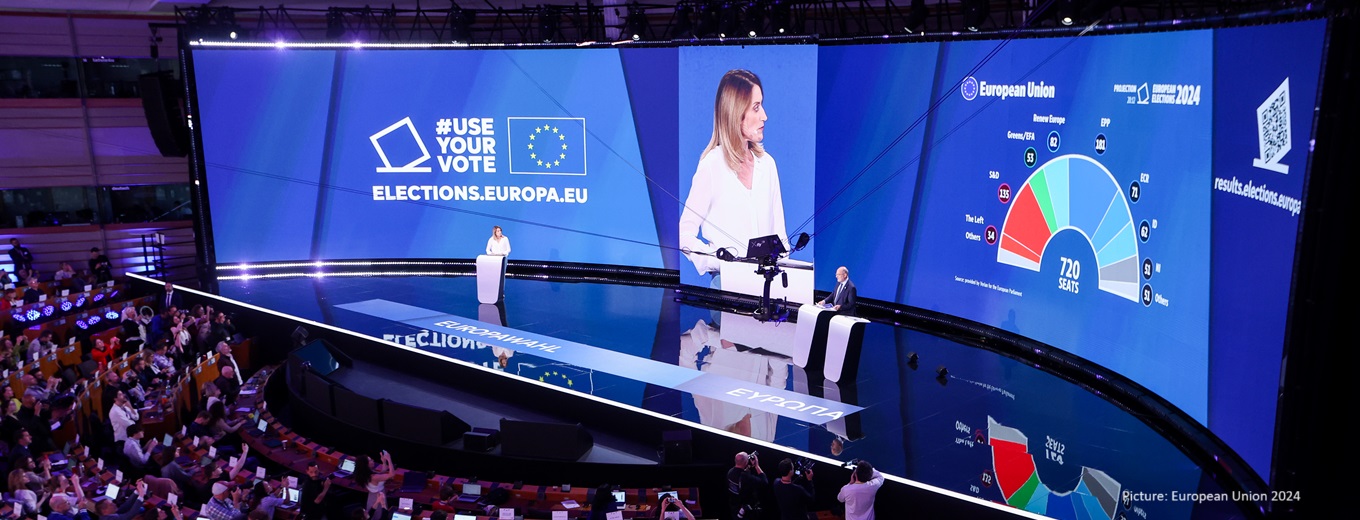The Commission adopts its proposal for the EU’s 2025 budget. The European Semester report highlights that FP10 should contribute more to improving the EU’s competitiveness.
The European Parliament (EP) elections of 6-10 June 2024 slightly increased fragmentation for the upcoming 2024-2029 legislative period after some gains by the far-right and losses for the greens compared to the outgoing EP. However, the centre held: The Group of the European People’s Party (EPP, Christian Democrats) of European Commission President Ursula von der Leyen received even a few more seats than in 2019 and remains with 189 of 720 seats the largest group according to the provisional EP election results. Of the other parties of the centre, the Group of the Progressive Alliance of Socialists and Democrats has now 136 seats, the Renew Europe Group 74, and the Group of Greens/European Free Alliance 51 seats. Thus, the official EPP candidate von der Leyen, stands a good chance of leading the next College of Commissioners into a second term from this autumn. Experts interviewed by Science Business (see article) expect largely continuity. An additional sign for continuity in the research and innovation (R&I) area is also the re-election of a key Member of the EP in the respective field, Christian Ehler.
Another important topic this month will influence next year’s R&I and education funding of the EU: On 19 June, the EC presented its proposal for the EU’s 2025 budget, which it set at €199.7 billion overall. The budget proposal includes €13.5 billion for research and innovation, of which €12.7 billion for Horizon Europe – slightly less than the €12.9 billion approved for 2024. The draft budget also includes the financing of the European Chips Act under Horizon Europe and the redeployment from other programmes. The redeployment of €2.1 billion from Horizon Europe agreed in the European Council Conclusions of 1 February foresees a minus of €397 million for 2025, €-617 million in 2026, and €-1,086 million for 2027, the last year of the current generation of EU programmes. Furthermore, the 2025 budget proposal foresees €4 billion for Erasmus+ (€3.8 billion in the approved 2024 budget) and €1.1 billion for the Digital Europe Programme (€1.3 billion in 2024). The annual budget for 2025 will have to be formally adopted by the Council and the European Parliament before the end of 2024.
The Commission also published policy guidance on 19 June that will influence debates in R&I and education policy at the EU and the national level. The EC identifies in its 2024 European Semester Spring Package as a slowdown in productivity growth since the early 2000s caused, among others, by “a lack of investment in research and innovation and persistent skills shortages”. The EC proposes country-specific recommendations (CSRs) to provide guidance to Member States, pursuing the goal of a more “robust and future-proof economy that secures competitiveness, resilience and long-term prosperity for all”. To achieve this, the CSRs also foresee an important role for investments into research and innovation: “Implement ambitious reforms to build integrated research and innovation ecosystems, focusing on science-business collaboration and knowledge transfers, for example.” Further, Member States should facilitate access to finance by improving savings allocation and capital financing and facilitating capital market and alternative forms of financing, especially for SMEs.
Yet another, albeit more technical, report was published by the EC earlier in the month: On 5 June, the EC adopted its ‘Annual Report on Research and Technological Development Activities of the European Union and Monitoring of Horizon Europe and Horizon 2020 in 2023’. This legally required report informs the European Parliament and the Council on the R&I related activities in 2023, with a focus on the EU’s open strategic autonomy, economic security, international cooperation, and support for Ukrainian researchers. In the monitoring part, the report shows the results and performance of the different parts of Horizon Europe and the Euratom programme in 2023.

